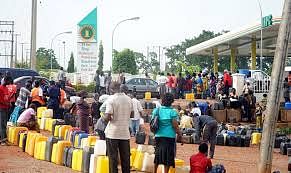Metro
Scarcity: Abuja residents lament as fuel sells for N1000 per litre

The Federal Capital Territory residents have lamented the outrageous prices of Premium Motor Spirit, popularly known as petrol.
As the nationwide fuel scarcity lingers over a week due to the importation of substandard fuel into the country, residents in Abuja as well as Lagos State, amongst other parts of the country, have been forced to buy petrol well above the normal [unp price of N165 per litre.
Black markets dealers have taken advantage of the shortage of fuel to sell for outrageous prices as low as N400 per litre in Lagos to N1000 per litre in Abuja.
According to DailyPost, black marketers in the Kurudu area of Abuja sell a litre of fuel at 1,000 naira, while 10 litres is sold for N4,500 in the Gwarimpa area.
WuzupNigeria also gathered that five litres of fuel is sold in kegs for the sum of N2000 in front of petrol stations in the Onipanu area.
“I bought two litres of fuel for two thousand naira from the black market because no filling station is selling around my area. From Kurudu to town is now 1200, Keke to Nyanya is 500.
“10 litres of fuel in the black market now sells for N4,500 in the Gwarimpa area,” an Abuja motorist lamented.
A tweep, @asufemi, also lamented the outrageous amount black market dealers are selling fuel.
“A friend in Abuja told me this morning that he has spent N30k in less than one week buying petrol from the black market where a litre is sold for N500, more than three times the official pump price. This is appalling,” he tweeted.
Meanwhile, the Independent Petroleum Marketers Association of Nigeria’s Public Relations Officer, Chief Chinedu Ukadike, in a chat with Vanguard, predicted that the fuel crisis may last for another two weeks because the Federal Government was yet to improve supply.
Similarly, the Statistician-General of the Federation, Mr. Simon Harry, has warned that the present fuel crises may have adverse effects on the inflation rate.
During a media conference to announce the January 2022 Consumer Price Index on Tuesday in Abuja, Harry said that the fuel crisis would create an artificial shock in the economy and that the shock was capable of shaking the economy.
“Whether we like it or not, transporters will be taking advantage of the situation, thereby, increasing the costs of transportation.
“As you are bringing your commodities to the market for sale, you will be thinking of adding some amount on the selling costs so that you will be able to recover the costs of transportation.
“So that gives us a negative signal that is capable of affecting not just inflation rate, but also other macro-economic variables such as the Gross Domestic Product (GDP) and even the unemployment rate.
“I can, however, assure you that certainly, it is not the best for the economy and if we must maintain a stable macroeconomic environment, this kind of crisis certainly is not the best for it is not needed,’’ he said.
-

 News53 mins ago
News53 mins agoTinubu secures $600m seaport investment from MAERSK Danish company
-

 News36 mins ago
News36 mins agoTinubu urges Samsung CEO to see Nigeria as investment destination
-

 News1 hour ago
News1 hour agoOgun schools resume third academic term today
-

 Economy54 mins ago
Economy54 mins agoNigeria-Niger border reopening responsible for rice price reduction — Millers
-

 News51 mins ago
News51 mins agoFive dead as deadly tornadoes hits US states
-

 Economy42 mins ago
Economy42 mins agoDon’t give tax holidays based on patronage, CITN tells FG


































